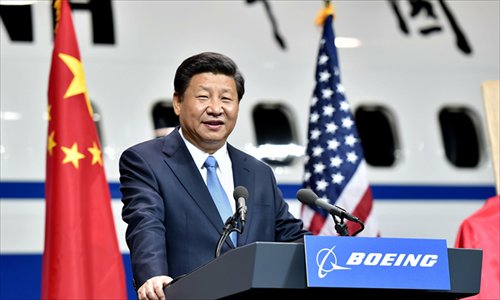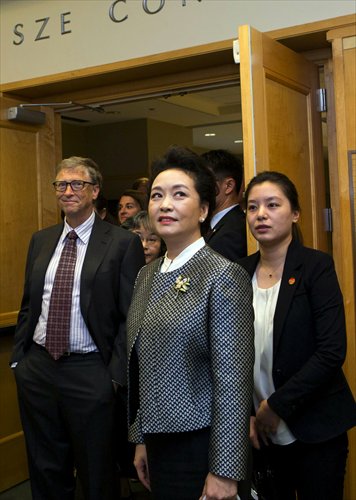Xi vows more opening-up
US business leaders assured of prospects of China growth

Chinese President Xi Jinping speaks at a welcome ceremony during his trip to Boeing on Wednesday in Seattle, Washington state. Photo: Xinhua

Bill Gates, co-chair and trustee of the Bill and Melinda Gates Foundation, accompanies Chinese first lady Peng Liyuan in her visit to the Fred Hutchinson Cancer Research Center on Wednesday in Seattle, Washington state. Photo: CFP
Chinese President Xi Jinping on Wednesday reassured US business leaders of the prospects of the Chinese economy, promising that China will adhere to reforms and opening-up.
"China will further open up to embrace new momentum from global economic growth, which will in turn enjoy the benefits from China's development," Xi said at a China-US CEO Roundtable in Seattle on the second day of his visit to the US.
The president called for deepening bilateral trade for the benefit of the two countries and global prosperity, as he spoke to over 30 business leaders at the forum, including the heads of Apple and Microsoft on the US side and Tencent and Baidu from China.
"The Chinese economy still has huge potentials, ample leeway and strong intrinsic tenacity, and is therefore fully capable of providing a broad market and solid support to the world economy," Xi said.
Analysts said the speech responded to Western media's concerns over China's economic reforms, and can help boost confidence in foreign investors to encourage more economic cooperation with the country.
"Xi's visit is expected to dispel concerns so as to enhance bilateral economic ties, which will also serve as a powerful engine as the two countries work to improve Sino-US relations," Yu Xiang, an associate research fellow at the Institute of American Studies of the China Institutes of Contemporary International Relations, told the Global Times.
Bilateral interests
"China is experiencing slower economic growth and stock market volatility … but the trend of China's economy toward growth and expansion has not changed," Xi said.
He added that China's economic fundamentals remain solid and the country's economy will continue to enjoy long-term medium-to-high growth, saying that China's 7 percent GDP growth rate proves it is still among the fastest growing in the world.
Xi's assurances can help soothe the nerves of US investors amid growing concerns and speculation in the West over China's economy, with some speculating that China may be targeting foreign companies and would not follow through its opening-up policies.
Such negative concerns will have a negative impact on Sino-US economic ties, according to Yu.
"A successful economic reform in China will also serve US interests. China's anti-monopoly investigations do not target foreign companies. It is part of the nation's efforts toward a market economy which should be open, fair and just," Yu said, adding that the US should stop politicizing differences in the economic system and trade.
Recalling the genesis of Walt Disney Co's Shanghai theme park in the late 2000s, Xi said other officials were pushing for a more Chinese culture-based project.
"I voted 'yes' for Disney," he said, "because China needs a diverse culture-based entertainment market."
"The US tends to emphasize ideological differences, so some businessmen see China through tainted glasses. This is another example to show that the Chinese market is in fact inclusive," Huang Wei, an expert at the Institute of World Economics and Politics at the Chinese Academy of Social Sciences, told the Global Times.
Attracting foreign investments
The president also pledged to greatly reduce restrictions on foreign investment access and enhance intellectual property rights, as the two countries advanced talks on the bilateral investment treaty (BIT).
China will support large US businesses in setting up regional headquarters or R&D facilities in China, and encourage more small- and medium-sized companies to expand their businesses in China, Xi added.
Huang said China has been attracting overseas investments and companies because of a growing demand from a rising middle-class, and a society in need of both basic infrastructure and technological support.
"Against the backdrop of the world economic slump, even the US feels the pressure. The two countries with complementary economic structures need cooperation to get out of economic dilemmas," Huang said.
In 2014, China became the largest recipient of foreign direct investment worth $128.5 billion, and Chinese companies will invest $1.25 trillion overseas in the next 10 years, according to Xi.
"Chinese companies also hope the US will take substantive steps to ease restrictions on exports of civilian high-tech items to China, and create a level playing field for Chinese investment in the US," he added.
Agencies contributed to this story